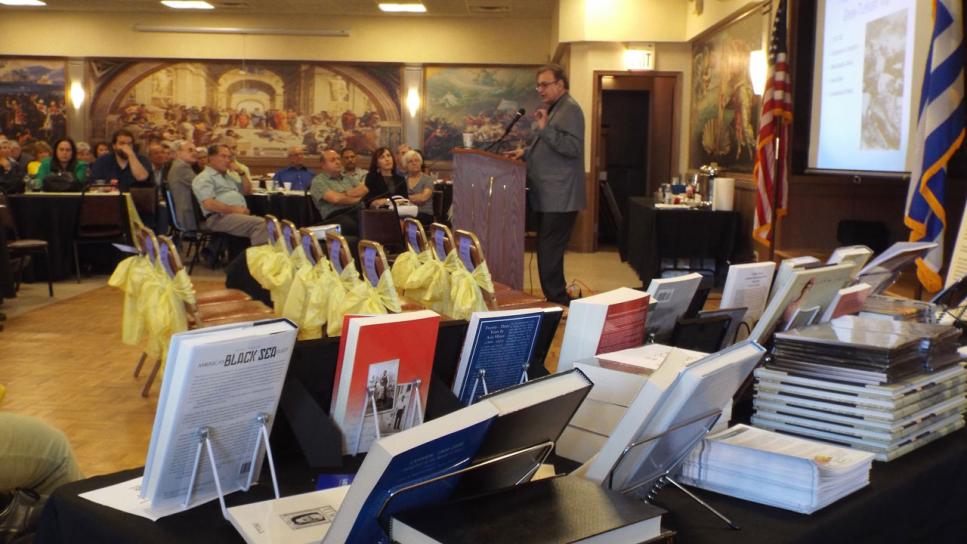On Saturday afternoon, May 31, 2014, the Asia Minor and Pontos Hellenic Research Center (AMPHRC), the Pontian Greek Society of Chicago and the Hellenic Link Midwest, sponsored a lecture titled “Genocide or Massacre: the Politics of Death” by Professor André Gerolymatos of Simon Fraser University, BC Canada. The lecture was held in front of a full house at the Cultural Center of the Hellenic American Community of Chicago in Chicago, IL, which included representatives from the Greek, Armenian, and Assyrian-American communities.
Professor Anastasia Giannakidou, a board member of the Asia Minor and Pontos Research Center, served as the emcee for the event and spoke briefly of the importance of holding such lectures every May to honor the 353,000 Pontian victims during the Ottoman Greek Genocide of 1914-1923.
A 5 minute trailer for a future documentary regarding the Genocide of the Ottoman Greeks titled “The Great Catastrophe: forgotten genocide” was then shown. After the presentation, Ms. Giannakidou spoke of the importance of the AMPHRC and its need for financial support in securing the necessary funds to produce the documentary.
Ms.Giannakidou then introduced Professor Gerolymatos, who presented a brief overview of the Pontian Greeks, who from the first millennium BC lived on the southern shore of the Black Sea and were a critical element of the Hellenistic and Byzantine civilizations before the rise of the Ottoman Turks. Their presence in the region is identified with the Homeric period and they maintained an uninterrupted habitation there until the genocide committed against the Greeks of Asia Minor, first by the Ottoman Empire and later by Turkish nationalists.
Mr. Gerolymatos focused on the events of the early 20th century, beginning with the “Young Turk” revolution against the Ottoman State in 1908 and moved on to the expulsions and massacres that ensued in the following years. One manner in which the Turks prepared for war was to expel the Greek populations from the coasts to the hinterland, fearing they would aid hostile forces in case of a Greek military invasion. In the process, the Turks robbed the Christians of their wealth. The professor then described how Greek soldiers were conscripted for labor battalions during the First World War. The appalling conditions resulted in an 80% mortality rate.
The last phase of the Genocide took place during the Greek-Turkish War of 1919-1922. The Restoration of King Constantine in Greece led the allied powers to abandon the Greeks. Turkish leader Mustafa Kemal took advantage of this opportunity to persecute leaders of the Pontian Greek community and commence a “cultural genocide” in which churches, public buildings, schools, etc. were targeted for destruction.

The Great Fire of Smyrna came as a result of the Greek military collapse in Asia Minor. The fire in Smyrna on September 13, 1922 along with the subsequent death marches resulted in the murder of 150,000 Greeks. Males aged 18-45 were deported to the interior; most did not return. 550,000 Greeks of Asia Minor along with 350,000 Greeks of Pontos were killed during the genocide; 1.5 million were relocated to Greece (250,000 were Pontians). Over 3 million Christians (Armenians,Assyrians, Greeks) lost their lives during these years.
Mr. Gerolymatos concluded that the systematic ethnic cleansing of the Greek population from its historic homeland in Asia Minor, central Anatolia, the Pontus, and the former Russian Caucasus province of Kars Oblast during the First World War and its aftermath was a crime against humanity. The professor ended his presentation by remarking that the greatest tragedy is that “we have failed to make it known.”
A question and answer session followed the conclusion of Mr. Gerolymatos’ lecture. A number of issues were raised, among them the activities of the Turkish lobby as evidenced by the number of Turkish chairs (65) endowed in the U.S. by Turkey compared to the number of Greek chairs (3). Other topics included the lack of a strong Greek American lobby to push for recognition of these events, American/Allied economic interests during the period in question, the geopolitics of the Great Powers during the Greek-Turkish war and the current Greek political stance of neutrality in terms of not promoting international recognition of the Genocide.
In comments made after the lecture, Mr. George Mavropoulos, Director of the Asia Minor and Pontos Hellenic Research Center stated, “We were happy with the successful turn-out and really appreciated Professor Gerolymatos’ comments on what needs to be done in terms of obtaining recognition of the Genocide. We are also thankful to Mr.Ted Spyropoulos, founder of the Ted and Erika Spyropoulos Foundation, for his generous purchase of the Cultural Center and for making it available for events that inform our community members of a dark page of our history.”



